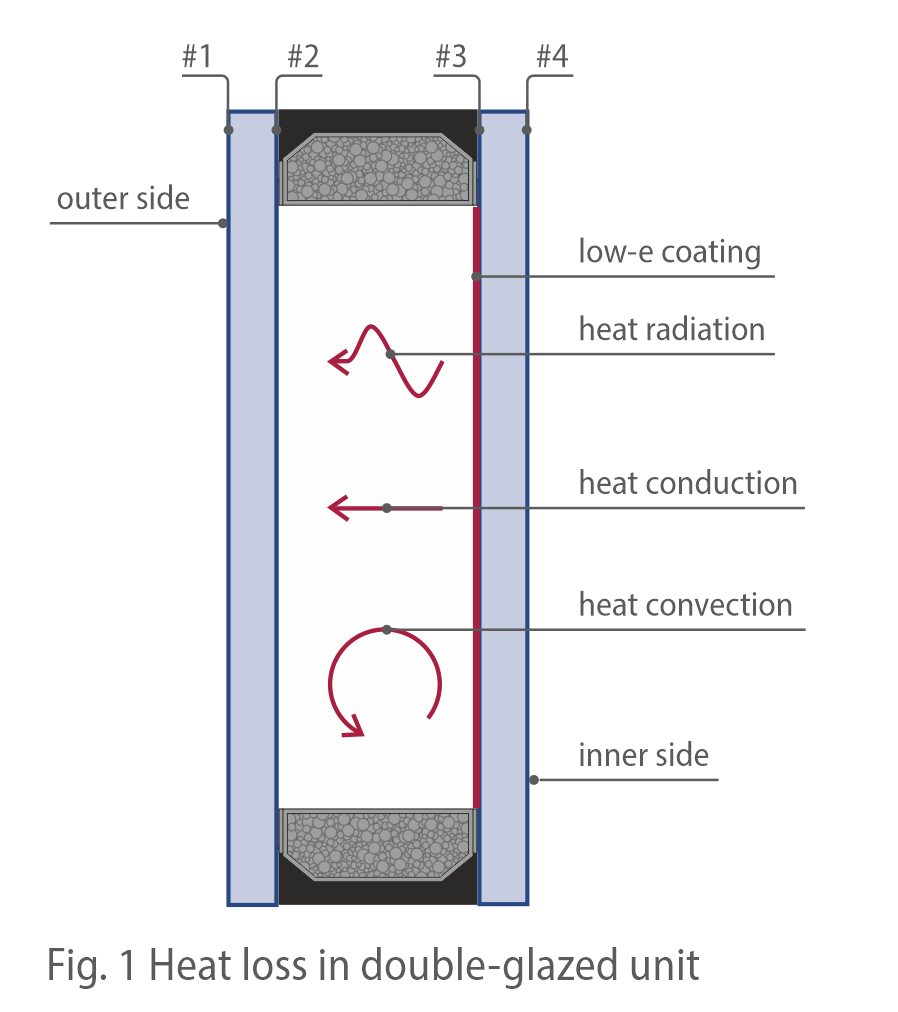Noble gases and thermal insulation in windows
Modern windows are required to have excellent performance properties, especially high thermal insulation. Both investors and manufacturers are looking for solutions that will allow to achieve the best parameters and create functional protection against unnecessary heat losses.
The insulating glass unit (IGU) consists of two or more glass panes joined together by a spacer and sealant. The space between the glass panes is filled with noble gas — usually argon or krypton. These gases are denser than air and reduce the amount of heat transfer through the IGU.
To understand how noble gas works, first we need to understand how heat moves through windows. There are three types of heat transfer: heat radiation, heat conduction and heat convection (Fig. 1). With double-glazed windows built of clear non-coated glass, radiation accounts for about 50% of the heat transfer, with conduction and convection each accounting for about 25%. When a low thermal emissivity (low-e) coating is added to a glass, the heat loss through radiation is significantly reduced (by up to 98%). As a result, the heat conduction and heat convection become much more significant. This is where low-conductivity noble gas comes to rescue as it improves insulating properties.

Air has a thermal conductivity of 0,026 W/(mK). If we replace that air with a lower-conductivity gas, we can slow the heat loss through windows. Argon has a conductivity of 0,018 W/(mK) — 33% lower than that of air. More exotic krypton has a conductivity of 0,009 W/(mK) which is 64% lower than that of air. Adding argon to a double-glazed window (without low-e coating) reduces the U-factor (rate of heat loss) by 10%. With low-e coating glass, argon lowers the U-factor by 17%. Using krypton drops the U-factor by 25%.
However, the best results are achieved by combining the advantages of noble gas with modern low-e glasses. In this case the heat loss can be reduced by impressive 70% in relation to traditional solutions — significant improvement in performance. Aside from insulating properties, noble gas brings also more benefits, e.g., it enhances soundproofing characteristics and reduces the possibility of internal condensation.
Nevertheless, for the noble gas in the windows to function properly, it must have a concentration of at least 85%; however, modern production lines offer higher gas concentration, thanks to the very efficient automated gas filling process. It is important to know that even perfectly constructed IGUs can be expected to lose about 1% of its gas per year. Consequently, only state-of-the-art machines and well controlled production process can ensure the high quality of IGUs that is critical for the best and long performance of windows.
When purchasing windows, a potential buyer cannot objectively assess the performance of the final product and components used in its production. Therefore, before making decision about the purchase, it is good to ask for documents (declaration of performance supported by test results and set of certificates confirming the compliance with European standards). This proves that the company from which we buy is serious about the quality of the offered product and is not afraid to test them in independent authorized laboratories.
Robert Mokwa
Quality Department Manager at PRESS GLASS



